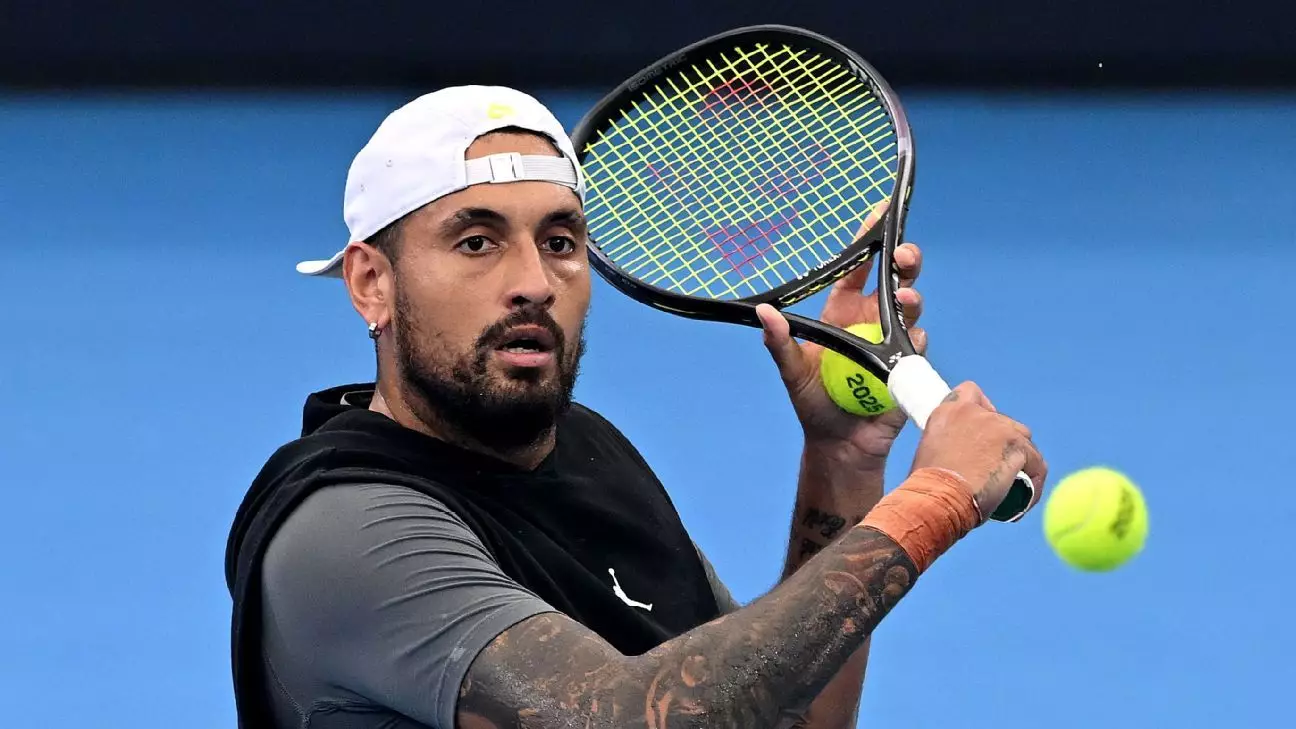In a bold and unfiltered statement, Australian tennis player Nick Kyrgios has sparked a heated debate within the tennis community by calling out fellow athletes Jannik Sinner and Iga Swiatek for their recent doping violations. Kyrgios, known for his fiery personality both on and off the court, accused the two stars of tarnishing the reputation of tennis with their breaches of the sport’s anti-doping regulations. The International Tennis Integrity Agency (ITIA) has charged Sinner, currently ranked world No.1, and former No.1 Swiatek for their respective violations.
This uproar comes in the wake of Sinner’s positive test for an anabolic steroid, specifically clostebol, and Swiatek’s suspension following a positive test for trimetazidine. Despite the serious implications of these violations, both players managed to navigate through their punishments with relatively light sanctions, raising eyebrows and frustration within the sport. Kyrgios did not mince words, stating, “Two world No.1s both getting done for doping is disgusting for our sport. It’s a horrible look.” His comments reflect a larger sentiment within tennis that integrity and credibility are at stake.
Kyrgios’s criticism shines a spotlight on a persistent issue in professional sports—the prevalence of performance-enhancing drug use. Though he has been sidelined since June 2023 due to injuries, Kyrgios’s passion for the game and its integrity remains unscathed. He emphasized his personal commitment to competing honestly, declaring, “I would never even in my entire life ever try and dope in this sport.” His statement is particularly poignant given the sheer physical toll that competitive tennis exacts on its players, sparking discussions on the pressures athletes face.
The Australian player articulated that the temptation to resort to shortcuts exists, especially for athletes recovering from injuries. He acknowledged the allure of drugs that could hasten healing and bolster performance but firmly rejected the idea of compromising his values. “There are so many things out there that are prohibited in our sport that I could have been doing to get me back quicker … that’s just not who I am,” he stated. This perspective serves as a rallying cry for maintaining the spirit of fair play in a sport facing growing scrutiny over doping violations.
While Sinner and Swiatek have presented their cases—Sinner attributing his positive test to accidental contamination by his physiotherapist, and Swiatek receiving a one-month suspension—Kyrgios’s remarks shed light on potential inconsistencies in their narratives. He questioned Sinner’s timeline and accountability, asking why it took months for the player’s team to address the contamination issue. “I’d be livid,” Kyrgios remarked, indicating that such a lapse in communication and responsibility raises concerns about the professionalism of the players’ support teams.
Kyrgios’s assertions highlight a crucial aspect of professional sports: the delicate balance between athlete autonomy and dependence on support personnel. An athlete’s integrity must not only pertain to their own actions but also the actions of those around them. The apparent lack of urgency from Sinner’s team introduces a troubling dynamic where accountability appears diluted.
Although Kyrgios has often been criticized for his outspokenness and emotional displays on the court, his tenacity in standing up for integrity in tennis may resonate with fans and fellow competitors alike. “For a kid that grew up playing tennis, I enjoyed the competition, I enjoyed playing,” he articulated, reflecting on the emotional investments of athletes in their sport. His criticisms of doping are not merely rooted in personal frustration but in a desire to preserve the essence of competitive integrity.
In a landscape where athletes can easily become embroiled in controversy, Kyrgios’s willingness to speak candidly about doping showcases a refreshing commitment to the sport’s values. He contends that emotional outbursts, such as breaking a racquet, pale in comparison to the grave implications of doping—an issue that he believes warrants more transparency and dialogue.
As the tennis world grapples with these allegations, the question remains—what reforms are necessary to restore trust and integrity within the sport? Kyrgios’s remarks may serve as a catalyst for broader discussions about how doping violations are enforced, how athletes and their teams are held accountable, and how the sport can protect its image going forward. If tennis is to remain a bastion of fairness and authenticity, then a collective commitment to addressing these issues head-on is imperative, transcending the temporary turmoil caused by individual players.


Leave a Reply